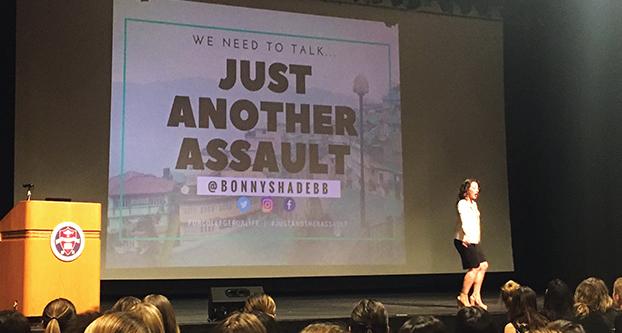Most female college students have probably attended what seems like a million sexual assault seminars.
These seminars tend to follow the same pattern and talk about the same issues.
First, the speakers explain what sexual assault is; they drag on about the term “consent”; tell their story about when they became a victim or ambassador of sexual assault; and then leave the audience with a list of resources to consult if they are ever sexually assaulted.
Earlier this week, I attended a similar talk on campus, but this one stood out among the masses. Sexual assault advocate and survivor Bonny Shade presented “Just Another Assault” in a way that was personal and honest. She was funny, truthful and most importantly, relatable.
Shade is a Panhellenic woman — an alumna of Zeta Tau Alpha — and gave her talk to a roomful of Fresno State sorority women on Badge Day. She said it’s important that we talk about sexual assault on Badge Day, a day meant to recognize the crest worn as sorority women who uphold the standards of those organizations.
Those standards aren’t met if we don’t know how to support a sister in a time of need or recognize when she needs help.
Shade began her talk by dancing on stage and singing along to the Spice Girls hit, “Wannabe.” She told us all about her sorority life and joked with us about going to fraternity parties and drinking more than she should have, but still having a fun and safe night. I think that’s when most of us gained some respect for Shade, because she was honest and outspoken.
Shade told the audience that she didn’t fully realize she was a survivor of sexual assault until 3,136 days after she was assaulted. She said her lightbulb moment was when she finished reading “Missoula: Rape and the Justice System in a College Town” by Jon Krakauer.
Most sexual assault presentations will tell you not to drink more than two drinks an hour and that putting yourself in a situation where there will be pressure to drink is increasing your chances of being sexually assaulted. I understand these statistics, but the fact of the matter is, these abstract numbers aren’t going to stop women from going out and having a good time.
Alcohol consumption is a part of college culture, and it surrounds our campus in Greek and non-Greek life. What Shade did during her talk was tell us it’s OK to go out and drink and be a part of that culture, but understanding how alcohol impairs the body differently for men and women can help you avoid overconsumption.
The usual buzzword when talking about sexual assault is “consent.” People are so tired of the “no means no” and “yes means yes” lectures that are given on college campuses, and so is Shade. She compared sex to ordering a burrito bowl at Chipotle. She said we are allowed to ask for extra rice and beans, but no tomatoes if that’s what we want.
Consent is not one word or a signed contract. Shade said that consent is a conversation between partners and understanding what is OK and what is not. This idea of consent being a dynamic interaction, and more than just yes and no, was really refreshing for me.
The one thing about this talk that was problematic was its audience.
Yes, women need to know about sexual assault and be aware of the resources provided to us. We need to understand that it is never the victim’s fault, and that we have the power to fight and say no or change our mind during intercourse.
But where are the slides that are telling our male colleagues that assaulting someone is not OK? Why wasn’t this presentation given to a roomful of young men, the main demographic perpetuating the problem?
We won’t see change and end sexual violence and assault until we start telling young men that enough is enough. We should be teaching them that when a girl has had too much to drink and doesn’t say “no,” that doesn’t mean “yes.”
Young men should have these talks twice as much as women do to understand just how much sexual assault hurts physically, emotionally and mentally.
Shade’s presentation was informative, moving, inspirational and entertaining — but we are targeting the wrong audience when we give the talk exclusively to women.




